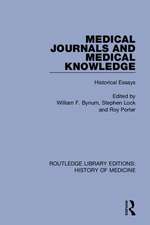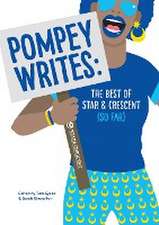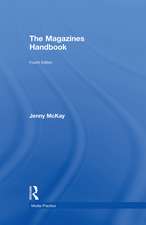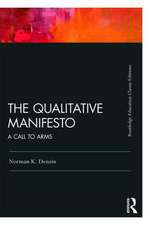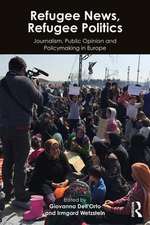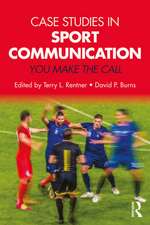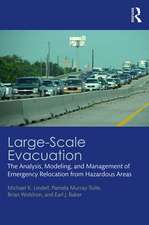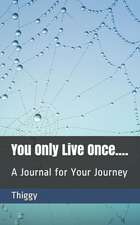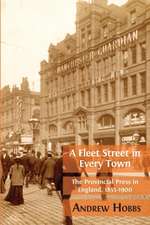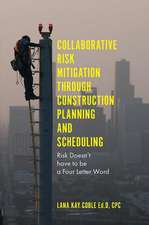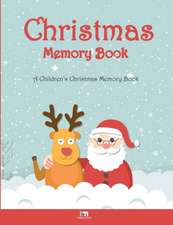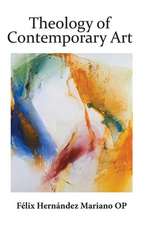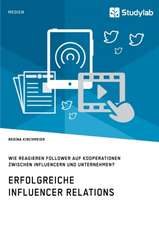Beyond Bogota: Diary of a Drug War Journalist in Colombia
Autor Garry Leechen Limba Engleză Paperback – 31 ian 2010
Beyond Bogotá is framed around the eleven hours that Leech was held captive by the FARC, Colombia's largest leftist guerrilla group, in August 2006. Drawing on unprecedented access to soldiers, guerrillas, paramilitaries, and peasants in conflict zones and cocaine-producing areas, Leech's documentary memoir is an epic tale of a journalist's search for meaning in the midst of violence and poverty. This compelling account provides fresh insights into U.S. foreign policy, the role of the media, and the plight of everyday Colombians caught in the middle of a brutal war.
Preț: 176.76 lei
Nou
Puncte Express: 265
Preț estimativ în valută:
33.83€ • 36.76$ • 28.44£
33.83€ • 36.76$ • 28.44£
Carte tipărită la comandă
Livrare economică 21 aprilie-05 mai
Preluare comenzi: 021 569.72.76
Specificații
ISBN-13: 9780807061480
ISBN-10: 0807061484
Pagini: 268
Dimensiuni: 137 x 213 x 20 mm
Greutate: 0.34 kg
Editura: Beacon Press (MA)
ISBN-10: 0807061484
Pagini: 268
Dimensiuni: 137 x 213 x 20 mm
Greutate: 0.34 kg
Editura: Beacon Press (MA)
Recenzii
Eye-opening . . . excellent reportage—highly recommended for would-be journalists as well as those interested in geopolitics.—Kirkus Reviews
"In this remarkable saga, Garry Leech conveys brilliantly and with vivid insight the magical qualities of this rich and tortured land, and the struggles and torment of its people."—Noam Chomsky
"That havoc within Colombia is portrayed with angry passion by the determined Garry Leech, that now rare beast in the jungle of journalism prepared to put his own life at the service of the truth. . . . A remarkable and captivating personal account of the drug war that unfolds mostly in Colombia.—Gavin O'Toole, Latin American Review of Books
"In this remarkable saga, Garry Leech conveys brilliantly and with vivid insight the magical qualities of this rich and tortured land, and the struggles and torment of its people."—Noam Chomsky
"That havoc within Colombia is portrayed with angry passion by the determined Garry Leech, that now rare beast in the jungle of journalism prepared to put his own life at the service of the truth. . . . A remarkable and captivating personal account of the drug war that unfolds mostly in Colombia.—Gavin O'Toole, Latin American Review of Books
Cuprins
A note from the author
The First Hour: 10:00 a.m., August 16, 2006
Entering La Macarena; my detention
The Second Hour: 11:00 a.m., August 16, 2006
My introduction to Latin America; a Salvadoran
Nightmare
The Third Hour: 12:00 p.m., August 16, 2006
The Panama invasion; Colombia’s two faces—
generosity and greed; indigenous villages and
oil in Ecuador
The Fourth Hour: 1:00 p.m., August 16, 2006
Welcome to Farclandia; Commander Simón Trinidad
and the rebel perspective; a meeting with Erika, a
teenage FARC guerrilla; Geraldo Rivera visits the
rebel safe haven
The Fifth Hour: 2:00 p.m., August 16, 2006
Investigating Plan Colombia; AUC commander
Luis Enrique and the paramilitary perspective;
a body in a hole
The Sixth Hour: 3:00 p.m., August 16, 2006
The displaced in Barranca; Gregorio and the
landmine; the cocaine lab; collusion and murder
in Puerto Asís
The Seventh Hour: 4:00 p.m., August 16, 2006
9/11 and the war on terror; detained by Carlos
Castaño’s paramilitaries; the battle for Saravena,
Colombia’s “Little Sarajevo”
The Eighth Hour: 5:00 p.m., August 16, 2006
Displaced Afro-Colombian communities of
the Chocó; the Bellavista tragedy; the plight
of the indigenous Embera
The Ninth Hour: 6:00 p.m., August 16, 2006
The Plan Patriota offensive; the new coca plant;
the predicament of Colombian journalists; Plan
Colombia becomes Plan Petroleum
The Tenth Hour: 7:00 p.m., August 16, 2006
Mining multinationals and human rights; the
displacement of Tabaco; indigenous massacres
in La Guajira and Nariño
The Eleventh Hour: 8:00 p.m., August 16, 2006
My release; chemical warfare in La Macarena
Epilogue: June 2007
Jungle rendezvous with FARC commander Raúl
Reyes; the prospects for peace
Timeline (1948ߝ2007)
Acknowledgments
Index
The First Hour: 10:00 a.m., August 16, 2006
Entering La Macarena; my detention
The Second Hour: 11:00 a.m., August 16, 2006
My introduction to Latin America; a Salvadoran
Nightmare
The Third Hour: 12:00 p.m., August 16, 2006
The Panama invasion; Colombia’s two faces—
generosity and greed; indigenous villages and
oil in Ecuador
The Fourth Hour: 1:00 p.m., August 16, 2006
Welcome to Farclandia; Commander Simón Trinidad
and the rebel perspective; a meeting with Erika, a
teenage FARC guerrilla; Geraldo Rivera visits the
rebel safe haven
The Fifth Hour: 2:00 p.m., August 16, 2006
Investigating Plan Colombia; AUC commander
Luis Enrique and the paramilitary perspective;
a body in a hole
The Sixth Hour: 3:00 p.m., August 16, 2006
The displaced in Barranca; Gregorio and the
landmine; the cocaine lab; collusion and murder
in Puerto Asís
The Seventh Hour: 4:00 p.m., August 16, 2006
9/11 and the war on terror; detained by Carlos
Castaño’s paramilitaries; the battle for Saravena,
Colombia’s “Little Sarajevo”
The Eighth Hour: 5:00 p.m., August 16, 2006
Displaced Afro-Colombian communities of
the Chocó; the Bellavista tragedy; the plight
of the indigenous Embera
The Ninth Hour: 6:00 p.m., August 16, 2006
The Plan Patriota offensive; the new coca plant;
the predicament of Colombian journalists; Plan
Colombia becomes Plan Petroleum
The Tenth Hour: 7:00 p.m., August 16, 2006
Mining multinationals and human rights; the
displacement of Tabaco; indigenous massacres
in La Guajira and Nariño
The Eleventh Hour: 8:00 p.m., August 16, 2006
My release; chemical warfare in La Macarena
Epilogue: June 2007
Jungle rendezvous with FARC commander Raúl
Reyes; the prospects for peace
Timeline (1948ߝ2007)
Acknowledgments
Index
Extras
The idea for this book emerged during an eleven-hour
detention I endured at the hands of Colombia’s largest guerrilla
group in August 2006. More specifically, it evolved from
thoughts that washed over me during that ordeal about my
three-month-old son, Owen. I couldn’t stop thinking that if
anything happened to me, either during that detention or at any
other time in Colombia, I wouldn’t be around to explain to
Owen, when he grew up, what sort of work his father did. Sure,
he could read my articles and books and discover my views on
U.S. policy in Colombia. But those writings do not explain how
I conduct my work. They don’t describe the challenges and adventures
involved in carrying out investigative journalism in
Colombia’s remote rural conflict zones. And they don’t depict
the moments of terror or those of inspiration that I have experienced
in my encounters with Colombians from many walks of
life. Most importantly, they don’t shed light on why I do this
sort of work and the path that led me to become a drug war
journalist. Consequently, Beyond Bogotá is the story of my
work in Colombia—a sort of memoir, if you will.
Naturally, my story cannot be separated from the larger
drama in which the principal protagonists are Colombians who
are living and dying every day in the midst of the country’s
decades-old civil conflict. Colombia is the world’s leading producer
and exporter of cocaine, and its illegal drug trade has fed
the habits of drug users in the United States for more than three
decades. As a result, we Americans are directly linked to
Colombia’s violent drama, both through ever-rising levels of
personal cocaine use and through the war on drugs that our
government has been waging in this South American country.
I have tried to place my personal story within the larger
contexts of the U.S. war on drugs and Colombia’s civil conflict.
I have drawn from my experiences working in various parts of
Colombia over the past eight years in an attempt to portray, as
comprehensively as possible, both my personal story and the
struggles of those rural Colombians who are caught in the middle
of the violence. There are not enough pages in this book for
me to include all of the Colombians I have met or even to reflect
on every region of the country in which I have worked. Therefore,
I have selected those people and places that I hope will
provide the reader with a relatively comprehensive portrayal of
life in Colombia’s rural conflict zones. Woven throughout are
accounts of the most profound and personal of my own experiences
in Colombia. Sadly, for their own safety, I have had to
change the names of some of the protagonists. I have not, however,
altered the names of those Colombians who are already
public figures or visible spokespersons for governments, organizations,
communities, or armed groups.
Ultimately, this book is an account of the U.S. war on drugs
and Colombia’s civil conflict as seen through the eyes of a journalist.
Colombia’s civil conflict and the war on drugs are complex
issues, and I don’t for a moment pretend that I fully grasp
all of their intricacies or that I have sufficiently addressed them
x A note from the author
in these pages. What I have tried to do is to recount my experiences
and observations as accurately and honestly as possible.
Beyond Bogotá is not a journalistic work, but rather the personal
story of a journalist’s search for meaning in the midst of
violence and poverty.
detention I endured at the hands of Colombia’s largest guerrilla
group in August 2006. More specifically, it evolved from
thoughts that washed over me during that ordeal about my
three-month-old son, Owen. I couldn’t stop thinking that if
anything happened to me, either during that detention or at any
other time in Colombia, I wouldn’t be around to explain to
Owen, when he grew up, what sort of work his father did. Sure,
he could read my articles and books and discover my views on
U.S. policy in Colombia. But those writings do not explain how
I conduct my work. They don’t describe the challenges and adventures
involved in carrying out investigative journalism in
Colombia’s remote rural conflict zones. And they don’t depict
the moments of terror or those of inspiration that I have experienced
in my encounters with Colombians from many walks of
life. Most importantly, they don’t shed light on why I do this
sort of work and the path that led me to become a drug war
journalist. Consequently, Beyond Bogotá is the story of my
work in Colombia—a sort of memoir, if you will.
Naturally, my story cannot be separated from the larger
drama in which the principal protagonists are Colombians who
are living and dying every day in the midst of the country’s
decades-old civil conflict. Colombia is the world’s leading producer
and exporter of cocaine, and its illegal drug trade has fed
the habits of drug users in the United States for more than three
decades. As a result, we Americans are directly linked to
Colombia’s violent drama, both through ever-rising levels of
personal cocaine use and through the war on drugs that our
government has been waging in this South American country.
I have tried to place my personal story within the larger
contexts of the U.S. war on drugs and Colombia’s civil conflict.
I have drawn from my experiences working in various parts of
Colombia over the past eight years in an attempt to portray, as
comprehensively as possible, both my personal story and the
struggles of those rural Colombians who are caught in the middle
of the violence. There are not enough pages in this book for
me to include all of the Colombians I have met or even to reflect
on every region of the country in which I have worked. Therefore,
I have selected those people and places that I hope will
provide the reader with a relatively comprehensive portrayal of
life in Colombia’s rural conflict zones. Woven throughout are
accounts of the most profound and personal of my own experiences
in Colombia. Sadly, for their own safety, I have had to
change the names of some of the protagonists. I have not, however,
altered the names of those Colombians who are already
public figures or visible spokespersons for governments, organizations,
communities, or armed groups.
Ultimately, this book is an account of the U.S. war on drugs
and Colombia’s civil conflict as seen through the eyes of a journalist.
Colombia’s civil conflict and the war on drugs are complex
issues, and I don’t for a moment pretend that I fully grasp
all of their intricacies or that I have sufficiently addressed them
x A note from the author
in these pages. What I have tried to do is to recount my experiences
and observations as accurately and honestly as possible.
Beyond Bogotá is not a journalistic work, but rather the personal
story of a journalist’s search for meaning in the midst of
violence and poverty.
Notă biografică
Garry Leech

